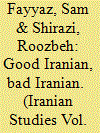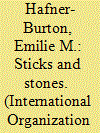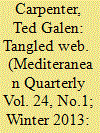| Srl | Item |
| 1 |
ID:
118791


|
|
|
|
|
| Publication |
2013.
|
| Summary/Abstract |
This article analyzes the ways in which Iran and Iranians are represented in Western news media sources. Through detailed textual analysis of articles in Time and Newsweek between 1998 and 2009, it demonstrates that journalistic representations of Iran and Iranians are not simply efforts aimed at describing the real Iran, but rather form the basis of what Said refers to as a powerful "community of interpretation" that often reflects and reproduces certain xenophobic stereotypes of non-Western foreign subjects. While some shifts in Western media representations of Iranians have occurred in the thirty years since the revolution, the underlying ontological assumptions of these representations have remained remarkably durable. That is to say, the dominant representational discourse found in these newsmagazines depicts the political behavior of Iranians on the basis of essentialized notions of Persian and/or Islamic civilization, while very often emphasizing the taken for granted superiority of the West. Earlier Orientalist discourses focus on the difference of non-Western foreign subjects by denigrating them as fundamentally anti-modern and incapable of political, cultural and economic development without Western intervention. This article presents an unmistakable discursive pattern in American journalism whereby certain Iranians
|
|
|
|
|
|
|
|
|
|
|
|
|
|
|
|
| 2 |
ID:
084827


|
|
|
|
|
| Publication |
2008.
|
| Summary/Abstract |
"Naming and shaming" is a popular strategy to enforce international human rights norms and laws. Nongovernmental organizations, news media, and international organizations publicize countries' violations and urge reform. Evidence that these spotlights are followed by improvements is anecdotal. This article analyzes the relationship between global naming and shaming efforts and governments' human rights practices for 145 countries from 1975 to 2000. The statistics show that governments put in the spotlight for abuses continue or even ramp up some violations afterward, while reducing others. One reason is that governments' capacities for human rights improvements vary across types of violations. Another is that governments are strategically using some violations to offset other improvements they make in response to international pressure to stop violations.
|
|
|
|
|
|
|
|
|
|
|
|
|
|
|
|
| 3 |
ID:
120897


|
|
|
|
|
| Publication |
2013.
|
| Summary/Abstract |
Western news media outlets have paid considerable attention to the civil war in Syria, but much of the coverage is simplistic and melodramatic. Too many accounts portray the conflict as a Manichean struggle between the evil, brutal regime of Bashar al-Assad and noble freedom fighters seeking to create a new, democratic Syria. The reality is far more complex and murky. Syria's turmoil has troubling, long-term implications not only for that country but for the Middle East as a whole, and even for the international system. The searing images of civilian casualties coming out of Syria have been hard to watch. Several thousand innocent people perished between the eruption of resistance to Assad's regime in March 2011 and the beginning of 2013, with no end in sight. There is little doubt that government forces were responsible for the majority of deaths. The prospect that Assad might be overthrown is understandably appealing to Westerners from a moral standpoint, but the West needs to be fully aware of the potential for unintended, and possibly quite unpleasant, consequences.
|
|
|
|
|
|
|
|
|
|
|
|
|
|
|
|